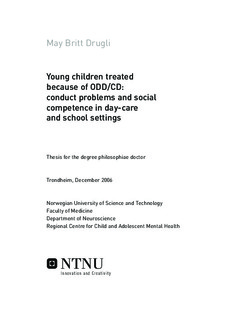| dc.contributor.author | Drugli, May Britt | nb_NO |
| dc.date.accessioned | 2014-12-19T14:21:04Z | |
| dc.date.available | 2014-12-19T14:21:04Z | |
| dc.date.created | 2007-05-02 | nb_NO |
| dc.date.issued | 2007 | nb_NO |
| dc.identifier | 122330 | nb_NO |
| dc.identifier.isbn | 978-82-471-0170-4 | nb_NO |
| dc.identifier.uri | http://hdl.handle.net/11250/263968 | |
| dc.description.abstract | The main aim of the present thesis was to study conduct and social problems in day-care and school settings in children treated with “The Incredible Years” parent training (PT) or parent training combined with child therapy (PT+CT). One hundred and twenty-seven children were included in a randomized controlled treatment study. Assessment was based on multiple informants (parent, teacher and child) before and after treatment and at a one-year follow-up. Most children from both treatment conditions showed a positive development in regard to conduct problems and social competence at home.
Before treatment, a great proportion of the children (83%) exhibited conduct problems both at home and in day-care/school settings, e.g. having pervasive conduct problems. According to teacher reports, children with pervasive conduct problems also exhibited significantly more internalizing and attention problems as well as social problems in their relationships both with peers and teachers as compared to those with only conduct problems at home. This finding indicates that children with pervasive conduct problems also have a range of serious emotional and social problems associated with their conduct problems in day-care and school. This picture was also corroborated in our qualitative study as reported in interviews with children’s teachers in day-care and school.
Only limited positive generalisation effects to day-care and school settings were found after treatment and at the one-year follow-up. Although the combined PT+CT treatment approach produced somewhat more positive generalisation effects as compared to PT treatment, most of these positive results were not maintained at the one-year follow-up. Neither was any positive development found in regard to child social competences or peerinteractions in day-care or school settings. In spite of reductions in child conduct problems and enhanced social competence at home, most children still showed serious behavioral and social problems in day-care and school after treatment, meaning that they still were at increased risk for lasting problems throughout childhood. In spite of engaged and devoted work evident in our qualitative study, teachers expressed difficulties providing support to children with conduct problems, They also seemed to have limited knowledge about how to work systematically and in cooperation with parents and other professionals with child conduct problems in day-care and school settings.
It is concluded that broad assessment including the use of multiple informants is needed when a child displays conduct problems. Further, it is important that generalisation effects are examined after the use of parent treatment methods as well as development of powerful maintenance strategies. The quality of support offered to children with conduct problems in day care/school settings needs to be further examined. Controlled intervention studies should be carried out in day-care and school to evaluate effects on child conduct problems in these settings. | nb_NO |
| dc.language | eng | nb_NO |
| dc.publisher | Det medisinske fakultet | nb_NO |
| dc.relation.ispartofseries | Doktoravhandlinger ved NTNU, 1503-8181; 2007:8 | nb_NO |
| dc.relation.haspart | Drugli, M.B.; Larsson, B; Clifford, G; Fossum, S. Pervasive and non-pervasive conduct problems in a clinic sample aged 4-8 years: child, family and day-care/school factors. Scandinavian Journal of Educational Research, 2007. | nb_NO |
| dc.relation.haspart | Drugli, M.B.; Larsson, B. Children aged 4–8 years treated with parent training and child therapy because of conduct problems: generalisation effects to day-care and school settings. European Child & Adolescent Psychiatry. 15(7): 392-399, 2006. | nb_NO |
| dc.relation.haspart | Drugli, M.B.; Larsson, B; Clifford, G. Changes in social competence in young children treated because of conduct problems as viewed by multiple informants. European Child and Adolescent Psychiatry, 2007. | nb_NO |
| dc.relation.haspart | Drugli, M.B.; Clifford, G; Larsson, B. Teacher’s experience and management of young children treated because of home conduct problems. A qualitative study. Scandinavian Journal of Educational Research, 2007. | nb_NO |
| dc.title | Young children treated because of ODD/CD: conduct problems and social competencies in day-care and school settings | nb_NO |
| dc.type | Doctoral thesis | nb_NO |
| dc.contributor.department | Norges teknisk-naturvitenskapelige universitet, Det medisinske fakultet, Institutt for nevromedisin | nb_NO |
